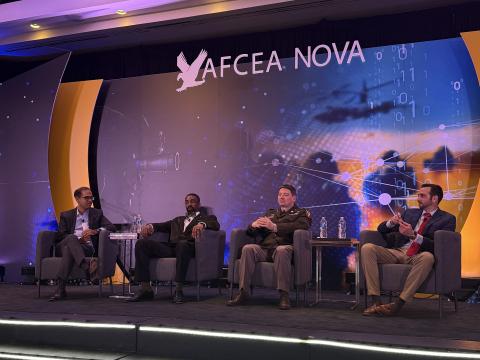DARPA’s Vision: Disruption, Quantum Sensing and the Next Frontier of AI
The Defense Advanced Research Projects Agency (DARPA) is a key leader in the realm of warfighting and innovation. More than 60 years after its founding, the agency continues to develop programs to fund artificial intelligence (AI) research and explore new strategic trends, such as quantum sensing.
DARPA was created in response to the launch of Sputnik in 1957, and the agency aims to ensure the United States never again faces a strategic technical surprise.
Rob McHenry, DARPA’s deputy director, joined the Mitchell Institute for Aerospace Studies for a webinar Wednesday, where he shared the four key pillars of DARPA: disruption, velocity, execution and impact.
“We would gladly have 100 programs fail if once a decade, we do something that changes everything. And we mean that,” McHenry said. “We demand that level of risk in our portfolio.”
Quantum sensing is a topic McHenry and his team have at the top of their minds.
“Quantum sensing has been a fascinating area of science for 15, 20 years, and one of the things we're seeing happening right now in the agency is we're transitioning from the era of quantum sensing as a science to quantum sensing as an engineering discipline that we can deploy in real-world situations and platforms,” he said. “So, I think we are about to see this wave of massive changes.”
In terms of incorporating AI, McHenry said the agency has been funding advanced research in AI since the '60s.
“We talked about the different waves of artificial intelligence over history, and DARPA has played a critical role in each of those waves, driving the technology forward,” he said.
Today, the agency continues to find disruptive applications of modern AI at a rapidly moving frontier.
“Probably the best example of that is a program called SCEPTER (Strategic Chaos Engine for Planning, Tactics, Experimentation and Resiliency), which is using an AI technique to massively accelerate very complex simulations,” McHenry explained, “tens of thousands of times faster than we've ever been able to do it before.”
DARPA also has a program called CODORD, or Human-AI Communication for Deontic Reasoning Devops, “which is exploring the different framing for how you develop artificial intelligence around beyond tech reasoning. It's a fundamentally different way to think about it," he said.





Comments